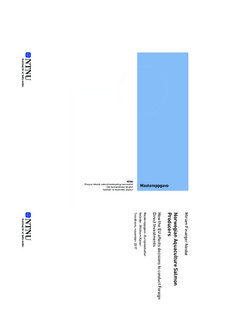| dc.contributor.advisor | Kaiser, Wolfram | |
| dc.contributor.author | Nesbø, Miriam Finanger | |
| dc.date.accessioned | 2018-01-04T14:51:56Z | |
| dc.date.available | 2018-01-04T14:51:56Z | |
| dc.date.issued | 2017 | |
| dc.identifier.uri | http://hdl.handle.net/11250/2475787 | |
| dc.description.abstract | Denne oppgaven undersøker EUs rolle i utførelsen av utenlandske direkte investeringer (FDI) av norske akvakulturbedrifter, og hvorvidt denne rollen er tilstrekkelig til å forklare disse beslutningene. Avhandlingen vil være en motsetning til tidligere forskning som konkluderer med at tariffhopping inn i EU-markedet er den viktigste forklaringen på FDIer gjort av norske oppdrettsbedrifter. I oppgaven har en periodisering blitt foretatt, og FDIer i disse avgrensede periodene har blitt analysert, og viser at kun FDIer i laksekrigperioden bør forklares av tariff-hopping. På tross av dette viser analysen at også de andre periodene ser en påvirkning av forholdet mellom Norge og EU delvis har påvirket beslutningen om å utføre FDI. Her da hovedsakelig gjennom å gi et stabilt marked som gir vekst og dermed kapital og frihet til å se til nye markeder og utføringen av FDIer innenfor og utenfor Norge. EØS-avtalen har også sikret stabile rettigheter for norske selskaper når det gjelder investeringer i EU.
This thesis researches the role of the EU in the conducting of Foreign Direct Investments (FDIs) by Norwegian aquaculture companies, and whether this role can prove sufficient in explaining the decisions. The thesis acts as an opposition to the previous research that concludes that tariff-jumping into the EU-market is the main explanation for FDIs by Norwegian aquaculture companies. The analysis shows through the division into periods that only FDIs in the Salmon Wars period should be explained by tariff-jumping into the EU-market. In the other periods, there is also strong indications that the Norway-EU relationship has partly affected the decisions to conduct FDIs mainly through providing a stable market that allows for growth, and thus the capital and freedom to look towards new markets and FDIs inside and outside Norway. The EEA-Agreement has also secured stable rights for Norwegian companies when it comes to investments in the EU. | nb_NO |
| dc.language.iso | eng | nb_NO |
| dc.publisher | NTNU | nb_NO |
| dc.subject | EU, FDI, Laks, Salmon, Aquaculture, Oppdrett | nb_NO |
| dc.title | Norwegian Aquaculture Salmon Producers - How the EU has affected decisions to conduct Foreign Direct Investments | nb_NO |
| dc.type | Master thesis | nb_NO |
